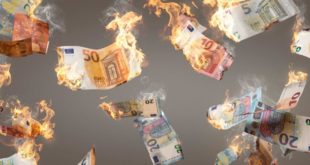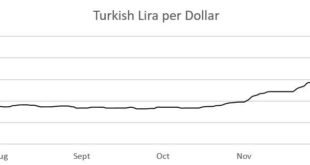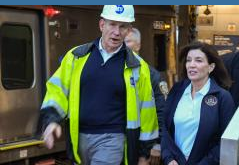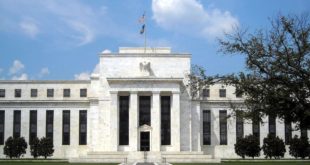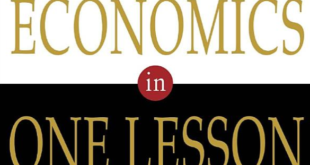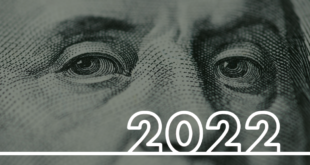Runaway house price inflation continues to characterize the U.S. market. House prices across the country rose 15.8% on average in October 2021 from the year before. U.S. house prices are far over their 2006 Bubble peak, and remain over the Bubble peak even after adjustment for consumer price inflation. They will keep on rising at the annual rate of 14–16% for the rest of 2021, according to the AEI Housing Center. Unbelievably, in this situation the Federal Reserve...
Read More »Ending Fiat Money Won’t Destroy the State
A certain meme has become popular among advocates of both gold and cryptocurrencies. This is the “Fix the money, fix the world” meme. This slogan is based on the idea that by switching to some commodity money—be it crypto or metal—and abandoning fiat currency, the world will improve greatly. Taken in its moderate form, of course, this slogan is indisputably correct. State-controlled money is immoral, dangerous, and impoverishing. It paves the way for government theft...
Read More »Turkey’s Economy Is in Big Trouble
Over the years observers of Turkish politics have become somewhat inured to erratic swings in policy coming out of Ankara. Particularly since the political reforms of 2017, his high degree of control over the primary functions of the state mean President Recep Tayyip Erdoğan faces few hurdles to executing abrupt changes he views as correct or necessary. This lack of any effective institutional check to his authority is, at present, leading the country off an economic...
Read More »Taking Back Our Liberty in 2022
For those of us who value liberty, these past two years have been a bad dream. It seems like we fell asleep in early 2020 and woke up in 1984! They said that if we just put on a mask and stayed home for two weeks, we’d be able to return to normal. The two weeks came and went and instead of going back to normal they added more restrictions. These past two years have been a story of moving goalposts and “experts” like Anthony Fauci constantly contradicting themselves....
Read More »New York State Has Imposed New Covid Rituals. This Time There’s Some Resistance.
With new mask and vaccine mandates, New York’s Governor Kathy Hochul has reaffirmed the state’s status as the nation’s most zealous practitioner of covid cultism. Original Article: “New York State Has Imposed New Covid Rituals. This Time There’s Some Resistance.” Friday, December 10, New York State governor Kathy Hochul reaffirmed the state’s status as the nation’s most zealous practitioner of covid cultism with the announcement of a new statewide “vax-or-mask”...
Read More »Inflation or Recession? The Fed Faces a Choice.
On December 15, the Federal Reserve announced numerous quantitative tightening measures that have the intended goal of combating the rising inflation that has been bogging down the American economy. As of November 2021, the rate of inflation has reached 6.8 percent, the highest since 1982, and is unlikely to have peaked yet. Despite Federal Reserve chairman Jerome Powell originally proclaiming this inflation spiral to be transitory, the Federal Reserve has announced...
Read More »The First Economics Lesson
Economics is haunted by more fallacies than any other study known to man. This is no accident. The inherent difficulties of the subject would be great enough in any case, but they are multiplied a thousandfold by a factor that is insignificant in, say, physics, mathematics, or medicine—the special pleading of selfish interests. While every group has certain economic interests identical with those of all groups, every group has also, as we shall see, interests...
Read More »True Competition versus the Monopolist “Minimal State”
According to Ayn Rand’s ethics, the only basis for value is an individual’s survival as a rational being. In order to live as a rational being, you must respect the rights of others as rational beings each aiming at his own survival. As Harry Binswanger, a leading follower of Rand, explains, The basic political principle of the Objectivist ethics is: no man may initiate the use of physical force against others. No man—or group or society or government—has the right...
Read More »An Inflation Outlook for the US Dollar in 2022
First, we must define inflation: it is the increase in the quantity of money, currency, and credit. It is not an increase in prices. Changes in the general price level is the consequence of a combination in changes of the quantity of deposit currency and changes in the level of the public’s retention of deposit currency relative to their possession of goods. We can record deposits statistically, but cannot quantify human behaviour. The effect of this inflation on...
Read More »The Businessman and the Holy Family
At the heart of the Christmas story rests some important lessons concerning free enterprise, government, and the role of wealth in society. Let’s begin with one of the most famous phrases: “There’s no room at the inn.” This phrase is often invoked as if it were a cruel and heartless dismissal of the tired travelers Joseph and Mary. Many renditions of the story conjure up images of the couple going from inn to inn only to have the owner barking at them to go away and...
Read More » Swiss Economicblogs.org
Swiss Economicblogs.org


